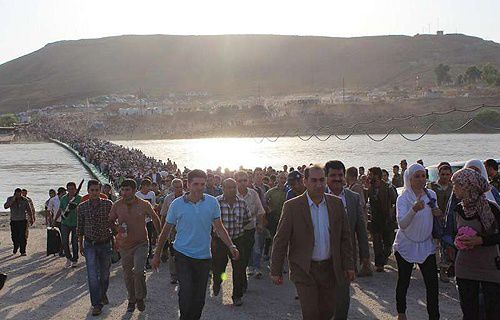As agencies meet at the Vatican to discuss the Syria crisis, the head of Catholic Relief Services said that the Church cannot forget those who suffer and must advocate for peace as well as provide aid. “The situation around Syria has not gotten better. There is no end in sight at this point,” Carolyn Woo, CEO and president of the U.S.-based Catholic Relief Services, told CNA in Rome May 30. She said the conflict has affected over nine million people, including 5.5 million children. About half of those affected are internally displaced and over two million are now refugees. “Many of them are living in camps. Just imagine those situations,” Woo said. “Think of all the areas of need.” A lack of security is a major problem that particularly endangers children and women. Access to medicine is also difficult. Children lack access to health care for minor issues and are not receiving an education. “Can you imagine the trauma people have gone through?” Woo asked. “Families are just torn apart. The needs are profound.” About 160,000 people have died since the conflict between rebels and Syria's government began in March 2011. “The most important thing to remember is that there is a human face behind everyone who suffers,” Woo continued. “It’s hard to identify with 9.3 million (people), but when you are with each child, you will see the human and the human suffering. And we just cannot abandon each other.” “People in a conflict say 'please don’t abandon us. Please don't forget us,'” said the relief agency head. The Pontifical Council Cor Unum, the charitable and humanitarian action arm of the Pope, on Friday held a meeting on the Syrian crisis with 25 Catholic charitable organizations, including Catholic Relief Services. Scheduled to speak at the meeting were Vatican Secretary of State Cardinal Pietro Parolin, apostolic nuncio to Syria Archbishop Mario Zenari, and Caritas Syria president Antoine Audo. The meeting was held to evaluate Catholic agencies' response to the crisis and to identify future priorities. The meeting will focus on collaboration between the agencies working in Syria and in nearby countries. The various agencies report their activities to an information office based in Beirut. Woo stressed both the difficulty of communication in a crisis situation and the importance of coordination to ensure that relief agencies supplement each other's work, rather than duplicate it. “Resources are so scarce and the need is so profound,” she said. Catholic Relief Services is focusing on several areas of aid, including food provisions, non-food items like winter survival supplies, medical services, education and psychosocial care. Woo called for more peace advocacy to complement the relief work, especially through engaging governments. “It's not just enough to work on the ground, because there will be no end (to the conflict),” she said. “It's not enough just to advocate because people are dying on the ground.” “In the end, the war is made possible because there’s a lot of money behind the war. If we stop the infusion of money and supplies, then the war on the ground will stop.” Woo said that war poses different problems for relief work than natural disasters, in which people come together and work to solve problems logically. It is easier to foresee and work towards an end to disaster relief. “War is a completely different challenge. It brings out the worst in humanity,” she said. “The difficulties are not just physical in nature,” she said, adding that it is hardest to accept the fact that “there are people whose interest is served by war.” She also emphasized the need for prayer. “These things look so overwhelming and so big. Sometimes we can feel that we do very little, but you have to remember that the Holy Spirit is at work,” Woo said. “War is the worst of humankind and it causes the best of humankind. It requires the best of everything you have, including your faith.” She said Pope Francis’ example has demonstrated “the call for peace.” She noted his visit with Syrian refugees in Jordan, where he brought along Jewish and a Muslim companions. Woo said that visit showed “peace and interfaith collaboration.” She said she hoped the Cor Unum meeting will affirm and celebrate the work that has been done and convey that there has been some progress. “A lot of our colleagues here have been working non-stop for three years, some of them under immensely difficult situations.”

